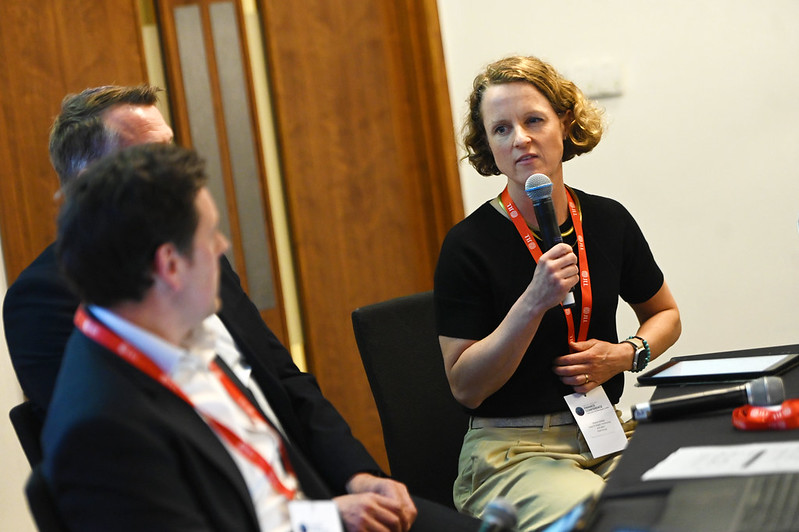The sustainability of the UK social housing sector – from housing quality to finance, skills to governance and retrofit to new build – was a central focus at a leading one-day conference in London last week.
And our director Luke Cross was there to help drive the conversation.
Housing is a core sector for us here at Social, so we were pleased to support the Social Housing Finance Conference on 8h May, with Luke chairing and leading the programme for the event’s first sustainable investing stream.
It’s always a good idea to check the housing headlines on the way to an event like this.
That certainly paid off this time, as a cross-party committee of MPs chose last Wednesday to release its highly-anticipated recommendations on the sustainability of housing finance, where it called on UK Government to divert capital grant funding away from shared ownership and affordable rent to support the delivery of more social rented homes.
The Levelling Up, Housing and Communities (LUHC) Committee’s report came after many written submissions and a lengthy period of oral evidence that heard from a wide range of sector figures.
It was a talking point throughout the day – not least during a session with committee chair Clive Betts MP, Peter Denton, chief executive of Homes England, Waqar Ahmed, group finance director at L&Q, and Bronwen Rapley, chief executive of Onward Homes and member of Homes for the North.
That session reminded us of all of the cuts to capital grant funding for social rented homes, introduced in 2010, the long-term impact of the four-year rent reduction to housing provider balance sheets and the ongoing difficulties brought about by the right to buy.
Speakers welcomed the call for renewed and focused investment in social rented housing, a debate over one part of the report that talked about shared ownership being delivered without grant subsidy and discussion over the role of institutional capital. There was the message that social housing will always need some form of subsidy and that while there is a huge opportunity in the right sort of patient private investment, there needs to be a willingness to accept a return that’s commensurate to the risk investors are willing to take.
The social housing sector is hopeful of a new era of investment and clarity with the next Government, at least over a 5-year horizon.
There was recognition at the conference that any new government will have many of the same socio-economic and financial challenges we have today – but that there is value in recognising housing as a driver of local economic growth, certainty around rent policy but also capital grant programmes, and in place-based thinking and outcomes.
And there was a good discussion over the opportunity to secure more support for the sector, while also conceding that asks for long-term policies will be difficult for any administration to commit to.
Over in the sustainable investing stream, we tackled some of the hot topics for housing, ESG and sustainable finance.
This included a ‘state of the sector’ session exploring what ESG reporting was telling us about sector performance, progress and risk – and how it can be used to better tell the sector’s story in an evidence-based way. We heard from
Sarah Forster, from The Good Economy and secretariat to Sustainability for Housing, on what ESG disclosure is telling us about housing associations’ progress towards more energy efficient homes, delivery of social rented housing and rent levels, along with diversity, equity and inclusion. This was supported by Arun Poobalasingham, from The Housing Finance Corporation, on key findings from their borrower pool, along with insights from Andrew Day, sustainability director at Hill Group, which tops the Next Generation sustainability benchmark.
Our second stream session was aimed at understanding how investors and housing associations are demonstrating their social impact, and the role of – and challenges with – ESG finance in this area. That discussion put people and community at the heart of driving and demonstrating social outcomes, but with a case to be made for using data and quantitative ways to calculate social value where appropriate and for certain audiences such as HM Treasury.
The third session heard from a Bromford resident, Debra Nott, and the housing association’s treasury director, Imran Mubeen, on recent efforts to bring residents, funders and credit rating agencies closer together to share experiences and show how finance can help deliver social purpose. An energetic discussion followed with Jamie Ratcliff, from housing association SNG, and Chinyelu Oranefo, from Lloyds Bank, on the roles and expectations of funders when it comes to sustainability and purpose, and the pros and cons of sustainable finance in driving social and environmental outcomes.
Lastly, we covered off best practice, challenges and what’s on the horizon for ESG and sustainability reporting – hearing from Isabelle Kirk, from housing association Stonewater, Janani Paramsothy, from Places for People and the ESG Working Group, Caroline Barr, from ABN Amro, and Zebrina Hanly, from Royal Mail and a committee member at Peabody. Some of the key challenges related to data integrity and management, along with finding ways through the alphabet soup of ESG and climate-related regulation and disclosure. One central message was around keeping the narrative as simple as possible – and the direction of travel for disclosure that is robust and objective.
A key takeaway for us is that sustainability is at the heart of purpose-driven organisations. It’s seen as being part and parcel of what the social housing sector exists for, whether that be about sustainable communities, development, tenancies or finance.
There is both challenge and huge opportunity in how this crucially important – and now high profile – sector demonstrates that commitment.


